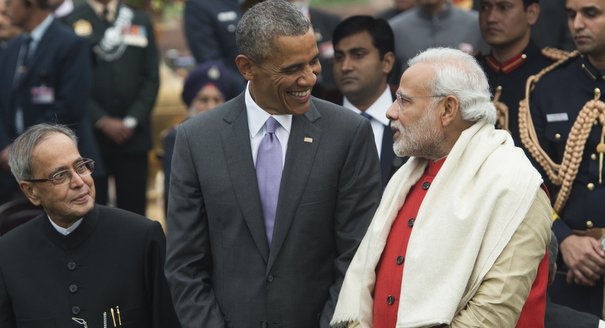Registration
You will receive an email confirming your registration.
The Carnegie Endowment for International Peace and the Confederation of Indian Industry hosted a conference on the future of the U.S.-India partnership, ten years after the Civil Nuclear Cooperation Initiative.
Welcome by William J. Burns and Chandrajit Banerjee
The opening to the day-long conference on the future of U.S.-India relations.
William J. Burns, president of the Carnegie Endowment for International Peace, and Chandrajit Banerjee, director general of the Confederation of Indian Industry, opened the day-long conference on the future of U.S.-India relations.
Chandrajit Banerjee
William J. Burns
President
Introductory Remarks by Arun K. Singh
The United States will continue to play an important role in India’s transformation.
Indian Ambassador Arun K. Singh expressed confidence that the United States would continue to play an important role in India’s transformation, and that the two countries would work together as partners to confront global challenges.
Arun K. Singh
Nonresident Senior Fellow, Carnegie India
Introductory Remarks by Nisha Desai Biswal
There is room for growth in bilateral trade between the United States and India.
Assistant Secretary of State for South and Central Asia Nisha Desai Biswal spoke about cooperation between the United States and India on strategic and economic issues, emphasizing the goal of increasing bilateral trade to $500 billion.
Nisha Desai Biswal
Video Address by Condoleezza Rice
In a video message, former Secretary of State Condoleezza Rice thanked the conference participants who had worked to make the U.S.-India nuclear deal a reality.
In a video message, former Secretary of State Condoleezza Rice thanked the conference participants who had worked to make the U.S.-India nuclear deal a reality, recalled some memorable episodes during the negotiations, and expressed optimism that the United States and India would grow closer as partners.
Condoleezza Rice
July 18, 2005: Looking Backward, Looking Forward
The story of how the Civil Nuclear Cooperation Initiative came about and what lessons can be drawn from it for future diplomatic efforts.
R. Nicholas Burns of the Harvard Kennedy School of Government, Shyam Saran of the National Security Advisory Board, and Philip Zelikow of the University of Virginia, all senior participants in the negotiation of the U.S.-India nuclear accord, told the story of how the deal came about and discussed what lessons can be drawn from it for future diplomatic efforts. Stephen E. Biegun of the Ford Motor Company moderated.
Shyam Saran
R. Nicholas Burns
Philip D. Zelikow
Stephen E. Biegun
Video Address by Suresh Prabhu
Shri Suresh Prabhakar Prabhu, India’s Union Minister of Railways, spoke about the future of U.S.-India relations.
Shri Suresh Prabhakar Prabhu, India’s Union Minister of Railways, spoke about the future of U.S.-India relations.
Suresh Prabhu
Transforming Economic Cooperation: The Open Frontier
India currently faces a number of economic obstacles, from improving the ease of doing business to attracting foreign investment.
India currently faces a number of economic obstacles, from improving the ease of doing business to attracting foreign investment. Rajiv Modi, chairman and managing director of Cadila Pharmaceuticals, Deep Kapuria, chairman of the Hi-Tech Group of companies, Kaushik Basu, chief economist of the World Bank, and Sumit Mazumder, president of the Confederation of Indian Industry, discussed how India can meet these challenges and others in order to attain its growth and development objectives. Swaminathan Aiyar, research fellow at the Cato Institute, served as moderator.
Rajiv I. Modi
Sumit Mazumder
Deep Kapuria
Kaushik Basu
Swaminathan S. Anklesaria Aiyar
Building Habits of Cooperation: a U.S.-India Statesmen Forum
Four former national security advisers from India and the United States reflected on broad international challenges and the U.S.-India partnership.
Four former national security advisers from India and the United States reflected on broad international challenges and the U.S.-India partnership. Stephen Hadley, chairman of the Board of Directors at the U.S. Institute of Peace and national security adviser to President George W. Bush, M.K. Narayanan, India’s third national security adviser, Shivshankar Menon, Fisher Family fellow in the Future of Diplomacy Project at Harvard’s Belfer Center for Science and International Affairs and former Indian national security adviser, and Thomas Donilon, attorney and partner at O’Melveny’s and national security adviser to President Barack Obama, discussed both their time in office and contemporary issues. Carnegie President William J. Burns served as moderator.
Defense and Security Partnership for a Stable Asia
Both the United States and India have immense strategic interests in the Indo-Pacific and in Asia more broadly, and the U.S.-India security and defense partnership will be valuable in achieving both their national and mutual goals.
Both the United States and India have immense strategic interests in the Indo-Pacific and in Asia more broadly, and the U.S.-India security and defense partnership will be valuable in achieving both their national and mutual goals. Robert Scher, assistant secretary of defense for the Office of Strategy, Plans, and Capabilities, Eliot Cohen, Robert E. Osgood professor at Johns Hopkins University’s School of Advanced International Studies, and Vikram Singh, vice president for national security and international policy at the Center for American Progress, discussed how the United States and India fit into one another’s broader strategic vision of Asia. Carnegie Senior Associate Ashley J. Tellis served as moderator.
Eliot A. Cohen
Robert M. Scher
Vikram J. Singh
Sukaran Singh
Ashley J. Tellis
Tata Chair for Strategic Affairs
